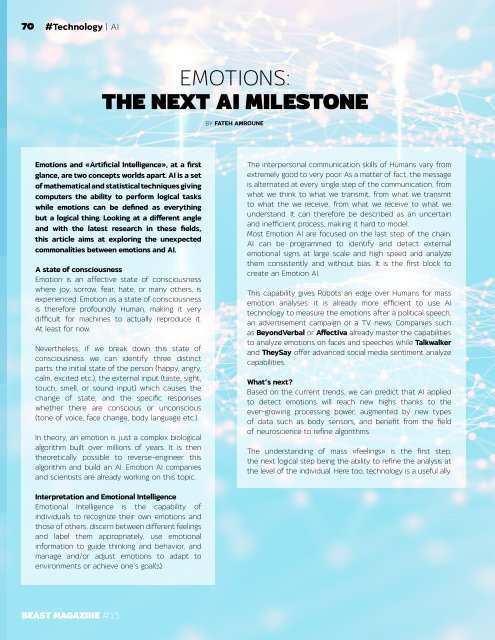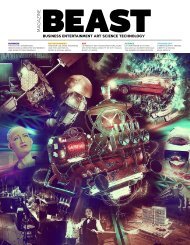Magazine BEAST #15 2019
Create successful ePaper yourself
Turn your PDF publications into a flip-book with our unique Google optimized e-Paper software.
70 #Technology | AI<br />
EMOTIONS:<br />
THE NEXT AI MILESTONE<br />
BY FATEH AMROUNE<br />
Emotions and «Artificial Intelligence», at a first<br />
glance, are two concepts worlds apart. AI is a set<br />
of mathematical and statistical techniques giving<br />
computers the ability to perform logical tasks<br />
while emotions can be defined as everything<br />
but a logical thing. Looking at a different angle<br />
and with the latest research in these fields,<br />
this article aims at exploring the unexpected<br />
commonalities between emotions and AI.<br />
A state of consciousness<br />
Emotion is an affective state of consciousness<br />
where joy, sorrow, fear, hate, or many others, is<br />
experienced. Emotion as a state of consciousness<br />
is therefore profoundly Human, making it very<br />
difficult for machines to actually reproduce it.<br />
At least for now.<br />
Nevertheless, if we break down this state of<br />
consciousness we can identify three distinct<br />
parts: the initial state of the person (happy, angry,<br />
calm, excited etc.), the external input (taste, sight,<br />
touch, smell, or sound input) which causes the<br />
change of state, and the specific responses<br />
whether there are conscious or unconscious<br />
(tone of voice, face change, body language etc.).<br />
In theory, an emotion is just a complex biological<br />
algorithm built over millions of years. It is then<br />
theoretically possible to reverse-engineer this<br />
algorithm and build an AI. Emotion AI companies<br />
and scientists are already working on this topic.<br />
The interpersonal communication skills of Humans vary from<br />
extremely good to very poor. As a matter of fact, the message<br />
is alternated at every single step of the communication, from<br />
what we think to what we transmit, from what we transmit<br />
to what the we receive, from what we receive to what we<br />
understand. It can therefore be described as an uncertain<br />
and inefficient process, making it hard to model.<br />
Most Emotion AI are focused on the last step of the chain.<br />
AI can be programmed to identify and detect external<br />
emotional signs at large scale and high speed and analyze<br />
them consistently and without bias. It is the first block to<br />
create an Emotion AI.<br />
This capability gives Robots an edge over Humans for mass<br />
emotion analyses: it is already more efficient to use AI<br />
technology to measure the emotions after a political speech,<br />
an advertisement campaign or a TV news. Companies such<br />
as BeyondVerbal or Affectiva already master the capabilities<br />
to analyze emotions on faces and speeches while Talkwalker<br />
and TheySay offer advanced social media sentiment analyze<br />
capabilities.<br />
What’s next?<br />
Based on the current trends, we can predict that AI applied<br />
to detect emotions will reach new highs thanks to the<br />
ever-growing processing power, augmented by new types<br />
of data such as body sensors, and benefit from the field<br />
of neuroscience to refine algorithms.<br />
The understanding of mass «feelings» is the first step,<br />
the next logical step being the ability to refine the analysis at<br />
the level of the individual. Here too, technology is a useful ally.<br />
Interpretation and Emotional Intelligence<br />
Emotional Intelligence is the capability of<br />
individuals to recognize their own emotions and<br />
those of others, discern between different feelings<br />
and label them appropriately, use emotional<br />
information to guide thinking and behavior, and<br />
manage and/or adjust emotions to adapt to<br />
environments or achieve one’s goal(s).<br />
<strong>BEAST</strong> MAGAZINE <strong>#15</strong>

















